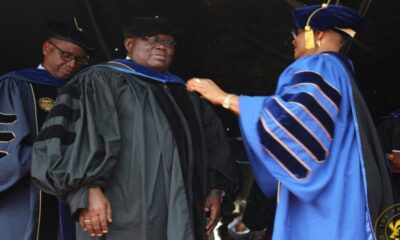GENERAL NEWS
HOLD SAVANNAH REGION TIGHT AND WORK HARD FOR DEVELOPMENT – PRESIDENT SAYS
President Nana Addo Dankwa Akufo-Addo has advised chiefs and people of the newly created Savannah Region to hold the region tight and with love to work harder for its development to eliminate poverty.
He said: “Now that you have your own region, hold it tight, work hard and develop it for the teeming youth to get employed as it is the surest way of eliminating poverty and other hardships for the benefit of all”.
He gave the advice at the Wasipewura’s Palace when he paid a courtesy call on the Paramount Chief of the Wasipe Traditional Area in the North Gonja District of the Savanna Region.
The visit was part of his tour of the six newly created regions, which seeks to establish a foundation for development in the regions.
The President commended the people for the good example showed in obedience to the rule of law from the submission of the petition through to the referendum and the creation of the region and assured that whatever it takes for the presidency to provide for the needed development would never elude the people.
He said he would continue to monitor activities of the region to ensure that the needed development took place to justify its creation.
The Gbenapewura sung-Bore I, a speaking on behalf of the Wasepewura, expressed confidence that the creation of the region would translate into accelerated development saying, “We are confident because we have a vibrant human resource base, abundant natural resources such as land and water, minerals, fossil fuel resources and above all a united front for a common purpose for a peaceful and hospitable environment “.
The Wasipewura used the opportunity to invite prospective investors to relocate to the area to venture into agriculture by taking advantage of the excess land in the area.
He mentioned some challenges in the district, which included lack of district hospital, lack of tertiary institution, and absence of a bridge over the White Volta Lake and poor road network.
He also appealed for a smock weaving centre and the upgrading of the military training camp at Tidrope into a barracks.
Mr Kwasi Amoako Atta, the Minister of Roads and Highways assured the people that work on the construction of a bridge over the White Volta Lake would commence before the end of the year.
He said plans were far advanced to continue the construction of the 56km road from Busunu to Daboya and the 70km road from Daboya to Mankarigu to facilitate movement and expressed the hope that the region would see an unprecedented development on roads.
The President also visited the Sawla-Tuna-Kalba district where he addressed a durbar of chiefs and students at the Sawla Senior High school.
He encouraged the students to work hard, follow their ambition, hold on to their aspirations and be steadfast to help them realize their dreams.
He later inspected an ongoing new hospital building project at Sawla.
GENERAL NEWS
DEBUT ALBUM: Miriam Mandipira & The Soul Family
DEBUT ALBUM by Miriam Mandipira & The Soul Family!
You’ve never heard a voice like Miriam Mandipira’s. Undeservedly, she doesn’t take credit for the power or presence she delivers. For Miriam, music is much more than just notes and words. It’s
magic. And faith. You can experience it LIVE and on the album, which is set to be released on September 1st.
She has been singing for as long as she can remember, growing up with her ears glued to the radio.
From the moment her school teacher asked her to sing in class, the rest has been history. From Africa to Denmark, from Book Café in Harare to Mojo Blues Bar and the big concert halls. From
Danish Radio Big Band to the Royal Theater. Music is music, and Miriam is the music.
“But it’s not about me when I sing. I’m just the instrument, and when I’m on stage with my band, I sing from a place that’s not about rules and technique but about emotions,” says the singer, who is
seriously trying her hand at songwriting – together with her Soul Family on the album “Ndiwe”, which means ‘you are the chosen one of my heart.’ The overall message is impossible to ignore
Love.
“Call me a soul singer, call me a jazz singer. I don’t care. Good music is good music, and I love interpreting other people’s songs and being inspired. At the same time, I think it’s great to try my
hand at creating and writing the songs myself – and with my friends in the Soul Family, I have found my place. They are my family, and the curiosity and respect we share are fantastic.”
You can experience that up close when Miriam & The Soul Family take the stage. The enthusiasm for music and communication is impossible to ignore and hear.
“I love to maintain the feeling of being a child. It’s an excitement and curiosity that keeps me going, and that’s why I’m so excited about every single concert – no matter how small or large it is.
Otherwise, I would never do it. This is not just a casual thing. This is a life, and everything means something,” says Miriam, who began her years in Denmark by jamming at Mojo Blues Bar, building a network.
Enjoy
ENTERTAINMENT
Bnoskka and Apprise Music Join Forces To Launch IP Zone Podcast

Bnoskka, a leading creative arts business and intellectual property consultant, is excited to announce its collaboration with Apprise Music, a renowned music publishing and distribution company, to launch the IP Zone Podcast. Hosted by Bnoskka, the podcast is now streaming on YouTube, Spotify and all major streaming platforms.
IP Zone Podcast delves into the fascinating world of intellectual property, creativity, and innovation, featuring insightful conversations with industry experts, artists, and thought leaders. With a focus on the music and creative industries, the podcast explores the latest trends, challenges, and opportunities in intellectual property, copyright, and innovation.

“I am thrilled to partner with Apprise Music to bring IP Zone Podcast to the public,” said Bnoskka. “Our goal is to create an engaging and informative platform that sparks meaningful discussions and inspires creativity. We believe that intellectual property is at the heart of innovation, and we’re excited to share this journey with our audience.”

“Apprise Music is dedicated to empowering creatives and artists to protect and monetize their intellectual property,” said Mr. Michael Bamfo, CEO of Apprise Music. “We’re proud to collaborate with Bnoskka on IP Zone Podcast, and we look forward to sharing our expertise and insights with the creative community.”
Tune in to IP Zone Podcast on YouTube, Spotify, Apple Podcasts, Google Podcasts, and other popular streaming platforms.
Subscribe now and join the conversations.
Contact:
Mr. Michael Bamfo
Email: [email protected]
Phone: +233 24 502 4002
About Bnoskka:
Bnoskka is a creative arts business and intellectual property consultant dedicated to empowering creatives and businesses to protect, monetize, and grow their intellectual property.
About Apprise Music:
Apprise Music is a music publishing and distribution company committed to supporting artists and creatives in the music industry.
-

 MUSIC4 weeks ago
MUSIC4 weeks agoJoseph Matthew Scoops Three Prestigious Nominations at Taabea Ghana Music Awards UK 2024
-

 MUSIC4 weeks ago
MUSIC4 weeks agoJoseph And The Kohanim Release “Okro Mouth”: A Powerful Blend Of Afrobeats, Gospel, And Salsa With A Message FOR Today’s World
-

 EDUCATION1 week ago
EDUCATION1 week agoKwegyir Aggrey Senior High Technical School Alumni Set to Make History with Inaugural Reunio
-

 MUSIC4 weeks ago
MUSIC4 weeks agoCharlorson – My Way (Prod By King One-Beatz)
-

 MUSIC4 days ago
MUSIC4 days agoApostle Eric Deh – Melodies Of Restoration EP
-

 MUSIC1 week ago
MUSIC1 week agoApostle Eric Deh Set To Release “Melodies Of Restoration” EP
-

 Lifestyle5 days ago
Lifestyle5 days agoKae Wakyi Rich Limited Is Set To Be Launched On Saturday,12th October
-

 MUSIC5 days ago
MUSIC5 days agoYeaboi Recruits Strongman On A New Song ‘Adaka’
















